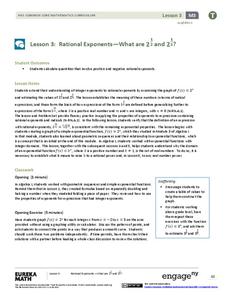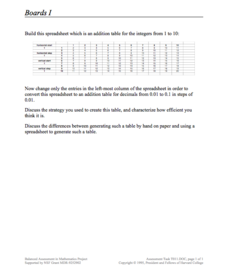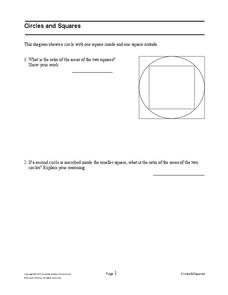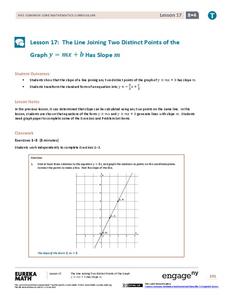S2tem Centers SC
Investigating Chance Processes of Probability
How likely is it that the school cafeteria will serve chicken tomorrow? Discover the concept of probability with the roll of the dice. Pupils evaluate the liklihood of several statments about everyday life. Then, a mathematical...
EngageNY
Even and Odd Numbers
Even or not, here I come. Groups investigate the parity of products and sums of whole numbers in the 17th lesson in a series of 21. Using dots to represent numbers, they develop a pattern for the products of two even numbers; two odd...
Concord Consortium
Broken Spreadsheet II
Work in reverse with the product becoming the given. Using a spreadsheet image of the graph of a trigonometric function, young scholars investigate methods of creating spreadsheet data that results in the given graph. The catch? The data...
Curated OER
Rating Systems
Your favorite sports team is ranked #1. How do the powers that be determine this rating? Learn how ratings are mathematically computed using probability concepts, from the Elo Rating System for chess to the Rating Percentage Index for...
EngageNY
Rational Exponents—What are 2^1/2 and 2^1/3?
Are you rooting for your high schoolers to learn about rational exponents? In the third installment of a 35-part module, pupils first learn the meaning of 2^(1/n) by estimating values on the graph of y = 2^x and by using algebraic...
EngageNY
Secant Lines; Secant Lines That Meet Inside a Circle
Young mathematicians identify different cases of intersecting secant lines. They then investigate the case where secant lines meet inside a circle.
University of Utah
Statistics-Investigate Patterns of Association in Bivariate Data
Young mathematicians construct and analyze patterns of association in bivariate data using scatter plots and linear models. The sixth chapter of a 10-part eighth grade workbook series then prompts class members to construct and...
Curated OER
Mathematical Puzzles
In this mathematical puzzles activity, students read a question about how old two mice could be. Students find as many possible answers as they can and record them.
Curated OER
Investigating Patterns to Develop Logarithm Rules
In this logarithmic activity, students make conjectures regarding the rules for condensing and expanding logarithms by investigating patterns. This is designed to be done as a group activity.
Mathematics Assessment Project
Circle Pattern
Cool circle patterns! To investigate patterns of shading in circles, learners use the values for specific examples of the pattern to generate a verbal rule for the arrangement.
Mathematics Assessment Project
Printing Tickets
That's the ticket! Pupils write and investigate two linear functions representing the cost of printing tickets. Individuals then determine which of two printing companies would be a better buy.
Balanced Assessment
Don't Fence Me In
Investigate the complexities of design problems using geometric concepts. The task asks scholars to design a fence for a horse based on the distance it can travel within one hour. It is a seemingly simple task — until individuals learn...
Concord Consortium
Boards I
Learners create patterns in a table to mimic the function of an electronic spreadsheet. The result is a table that creates an addition table for decimals in intervals of one-tenth. While creating the pattern, pupils must thoroughly...
Mathematics Assessment Project
Circles and Squares
Squares, and circles ... and squares, and more circles. In this high school assessment task, pupils investigate the ratio of areas of two squares that are circumscribed and inscribed in a circle. They then determine the ratio of the area...
University of Utah
Geometry: Angles, Triangles, and Distance
The Pythagorean Theorem is a staple of middle school geometry. Scholars first investigate angle relationships, both in triangles and in parallel lines with a transversal, before proving and applying the Pythagorean Theorem.
National Council of Teachers of Mathematics
Stitching Quilts into Coordinate Geometry
Who knew quilting would be so mathematical? Introduce linear equations and graphing while working with the lines of pre-designed quilts. Use the parts of the design to calculate the slope of the linear segments. The project...
Mathematics Assessment Project
Pythagorean Triples
What special relationships exist in right triangles? In the high school performance task, learners investigate Pythagorean triples. They then determine rules for the perimeter and area of right triangles given the shortest side.
Curated OER
Mathematical Modeling
In this Pre-Calculus worksheet, learners investigate the process of formulating, solving, and interpreting mathematical models. The ten page worksheet contains explanation and four solved examples to serve as a guide for the...
EngageNY
Random Sampling
Sample pennies to gain an understanding of their ages. The 16th installment of a 25-part series requires groups to collect samples from a jar of pennies. Pupils compare the distribution of their samples with the distribution of the...
EngageNY
The Line Joining Two Distinct Points of the Graph y=mx+b Has Slope m
Investigate the relationship between the slope-intercept form and the slope of the graph. The lesson plan leads an investigation of the slope-intercept equation of a line and its slope. Pupils realize the slope is the same as the...
EngageNY
Understanding Variability When Estimating a Population Proportion
Estimate the proportion in a population using sampling. The 20th installment in a series of 25 introduces how to determine proportions of categorical data within a population. Groups take random samples from a bag of cubes to determine...
Indian Institute of Technology
Could King Kong Exist?
The title says it all: Could King Kong exist? Investigate how increasing the dimensions of an object affects its surface area and volume to mathematically conclude whether a creature with the weight and height of King Kong could actually...
EngageNY
The Scaling Principle for Area
As they investigate scaling figures and calculate the resulting areas, groups determine the area of similar figures. They continue to investigate the results when the vertical and horizontal scales are not equal.
EngageNY
Properties of Dilations
Investigate dilations to learn more about them. The second segment in a series of 16 provides a discussion of properties of dilations by going through examples. The problem set provides opportunities for scholars to construct dilations.























